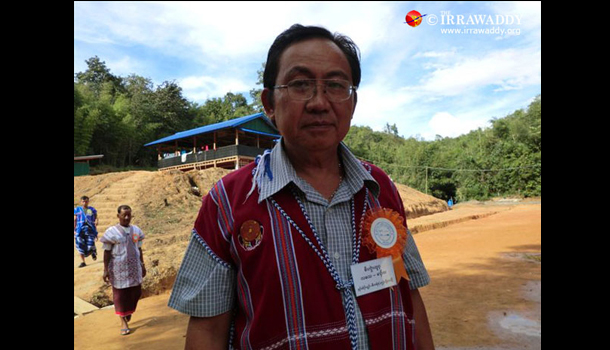Kwe Htoo Win, the newly elected general-secretary of Karen National Union (KNU), is quietly known among the Karen public to be one of the most pragmatic within the organization’s leadership.
He became governor of the KNU’s Mergui/Dawei District in 1990 and was part of the team that accompanied Gen Bo Mya on his trip to Rangoon, where they negotiated what was known as the “gentlemen’s agreement” with former junta spy chief Gen Khin Nyunt in January 2004. Kwe Htoo has remained active in peace negotiation efforts ever since.
Prior to joining the Karen resistance movement in 1974, Kwe Htoo studied economics at Rangoon University but could not realize his scholarly aspirations due to the government’s closure of the institution in response to a student movement known as the “U Thant Crisis.”
“We as the organization need to evolve around the ever-changing circumstances,” once said Kwe Htoo. Among younger, emerging Karen political leaders, he is regarded as one of the most progressive and well-attuned to changing regional political dynamics. “Our revolution needs new blood, new ideas and new thinking,” said Kwe Htoo.
Despite huge popularity in his southern district, Kwe Htoo is not without his critics in Karen politics. Some in the top KNU leadership feel that he has pushed for change within the organization much harder than was necessary.
With the advance of overwhelmingly stronger Burmese troops to his area in 1997, he was able to display his skillful leadership by handling the orderly relocation of hundreds of thousands of villagers from the previously rebel-controlled territory to refugee camps along the Thai-Burmese border.
Kwe Htoo won the hearts and minds of his people by maintaining close relations with the grassroots community throughout this most difficult time—essentially managing to maintain order amid the most chaotic of situations.
He traveled several times to Geneva and London between 1997 and 2002 to inform the United Nations Human Rights Commission, key British parliamentarians as well as the UK Foreign Office and London-based non-governmental organizations of the deteriorating human rights situation in Karen State, and demand urgently needed humanitarian assistance for internally displaced people.
While he understands the importance of international pressure, Kwe Htoo places a high priority on being close to his suffering people. Despite his busy schedule, he makes the effort to spend time in Karen territory, traveling from village-to-village in his district while urging his people to maintain high political alertness. He likes meeting and listening to what ordinary people have to say. “He feels our pains,” once commented a villager.
He may be lesser known in broader Burmese national politics, but Kwe Htoo, for many Karen, is a trusted leader with a progressive mind and who does not compromise his people’s needs by taking a place in national politics. Such selflessness, indeed, is a rare trait of leadership. Among the grassroots Karen community, he is considered one of the best hopes for the new wave of the Karen resistance movement.
Kwe Htoo, the devote father-of-six, is married to Naw Sar Rah. Aside from politics, he retains a keen interest in Karen language, literature, history and traditional music.
Saw Kapi, a former political activist and an ethnic Karen from Burma, is a university administrator currently working as the director of admissions and records at California State University, Bakersfield. The views expressed here do not necessarily reflect those of The Irrawaddy.















